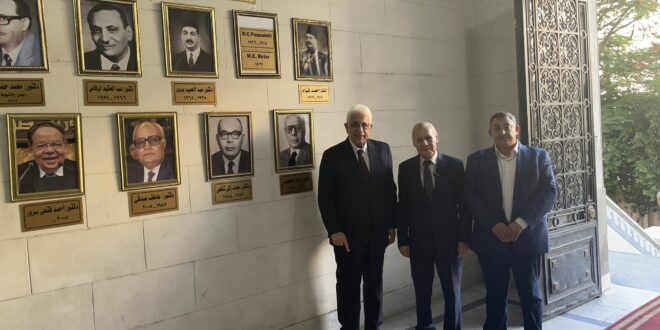Lecture on the future of education at the Library of Alexandria
Within the framework of the cultural season of the Library of Alexandria, Dr. Hossam Badrawi, at the invitation of Dr. Ahmed Zayed, Director of the Library, and in the presence of senior figures from Alexandria Governorate, writers, scholars, researchers, professors at Alexandria University, representatives of Parliament, and media representatives, gave a lecture entitled “The Future of Education in the Era of the Digital Revolution.”
Library Director Dr. Ahmed Zayed presented Dr. Badrawi, saying, “An exceptional personality. He is the scientist, doctor, thinker, and politician who excels in his books and articles. Dr. Hossam Badrawi is the owner of a philosophical school of thought, with clear trends. I enjoyed one of his latest books, “Me and Memes.”
I have repeatedly collaborated with Dr. Hossam on education committees, and he is a great teacher and teacher. His contributions to education are respected and documented.
Dr. Hossam’s lecture included a general vision for education in the world and in Egypt. Then he took the attendees with him on a tour of Egypt’s 2030 vision in education, because it is the foundation upon which to build to enter the world of digitization and artificial intelligence. He stressed that our children and youth are capable of keeping pace with development, and we gave them the opportunity and the climate. Which they excel at.
Dr. Hossam said: How can a comprehensive approach based on artificial intelligence be effective in achieving sustainable development goals, with the risks and opportunities this represents for human well-being?
While AI heralds societal progress, its prevalent use in warfare and surveillance raises concerns.
To prevent possible catastrophic outcomes, technologies that rely on artificial intelligence must be governed by strict ethical rules.
Dr.’s talk extended. Hossam pointed out the difference between definitions and explaining what artificial intelligence is, and he said: We have to realize the meanings that we think are understandable to the general public, but they are not.
Two examples that I will mention here are the difference between reaction and proactive action. (reactive vs proactive)
The second is the difference between regular computing, no matter how advanced it is, and artificial intelligence.
The basic difference between reactive behavior and proactive behavior lies in how one responds to situations and events. Reactive behavior focuses on confronting challenges after they appear.
This approach often involves short-term decisions without considering the long-term impact and focuses on the current situation.
Proactive behavior depends on anticipation, preparation, and taking action before situations occur.
– It is a behavior directed towards seizing possible opportunities and avoiding problems before they occur. You may even participate in creating the event itself.
The second issue is the difference between the concept of regular computing, no matter how powerful it is, and artificial intelligence.
———
Ordinary computing, also known as classical computing, took time for many people to understand, and relies on a specific set of instructions or algorithms to perform tasks, but the same input will always produce the same output.
Examples include basic arithmetic operations, data processing tasks, and software applications that do not learn from data but operate within their programmed capabilities.
Artificial intelligence, on the other hand, refers to the development of systems that can perform tasks that normally require human intelligence.
Unlike regular computing, AI systems are designed to improve their performance over time by learning from the data they process
In continuous warmth, welcome and appreciation from the attendees, the lecture ended with souvenir photos with everyone in an atmosphere of mutual respect and hope for a better tomorrow for Egypt.
Dr. Yousry El-Gamal, former Minister of Education, attended the meeting and commented praising the lecture.
https://www.albawabhnews.com/5034514
 Dr. Hossam Badrawi Official Website
Dr. Hossam Badrawi Official Website


